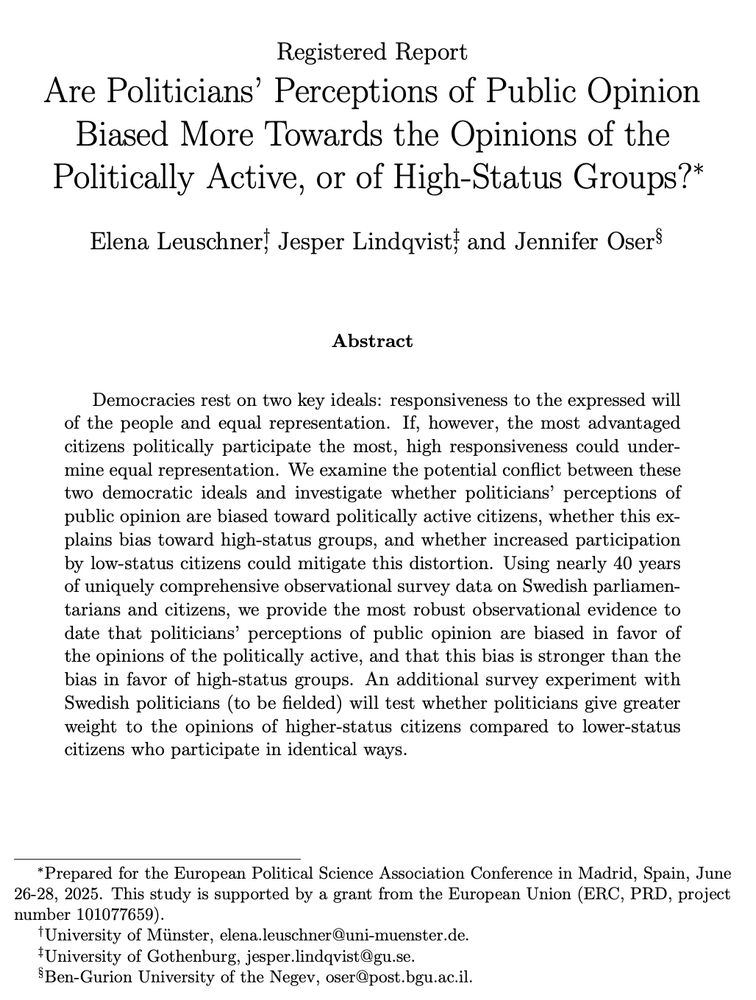
Is unequal representation the consequence of different voting behavior across income groups?
Extant literature documents the unequal representation of the interests of low- and high-income groups in democracies. One potential explanation for t…
Our study thus speaks against the "electoral explanation" of unequal opinion-policy congruence. @annakurella.bsky.social @nathaliegiger.bsky.social and @janrosset.bsky.social found evidence pointing in a similar direction in an interesting study last year: www.sciencedirect.com/science/arti...
24.09.2025 08:05 — 👍 3 🔁 2 💬 0 📌 0
Happy to see our study out! Our main takeaway is that while poor voters vote less often, are less ideologically aligned with their preferred party, and see their preferred party less often in government - voting still does not seem to explain unequal representation.
24.09.2025 07:57 — 👍 8 🔁 5 💬 1 📌 0

Somehow, it's already time for #APSA2025! Presenting the newest version of my paper w @jenny-oser.bsky.social + @jesperlindqvist.bsky.social on political participation and politicians' perceptions of public opinion.
Happy to meet during the conference, so please reach out!
@apsa.bsky.social
08.09.2025 15:36 — 👍 10 🔁 6 💬 1 📌 1
EPSA have announced that they will hold a conference in July 2026.
😵💫 We understand that there might be some confusion about EPSS and EPSA.
👉🏽 So we thought we would clarify some things.
A short 🧵
07.08.2025 16:28 — 👍 182 🔁 146 💬 1 📌 14

I'm presenting work w the amazing @jenny-oser.bsky.social and @jesperlindqvist.bsky.social at #EPSA2025 on Thursday.
We combine 40 years of parallel surveys among citizens/MPs + a survey experiment w Swedish politicians on participation and public opinion
Come and say hi - always happy to meet!
24.06.2025 08:56 — 👍 42 🔁 7 💬 1 📌 1
Very interesting paper about the left-right dimension!
19.05.2025 09:28 — 👍 3 🔁 0 💬 0 📌 0
Great to see this finally out! It's an interesting paper because we examine whether unequal representation is caused by how low- and high-income people vote (for example ideological voting). Our findings goes against this idea, meaning that unequal representation must be caused by something else!
11.04.2025 13:42 — 👍 2 🔁 2 💬 0 📌 0
Asymmetric Responsiveness: The Effects of Protesters’ Demographics and Policy Preferences on the Political Agenda
New working paper!
How do protesters' demographics and policy preferences affect politicians' responsiveness to their demands? I find no effects of shared demographics btw. protesters and politicians, but asymmetric responsiveness to left-right policy preferences: gupea.ub.gu.se/handle/2077/...
18.12.2024 07:55 — 👍 31 🔁 11 💬 0 📌 1
No worries, thank you for sharing yours! :)
29.03.2024 19:44 — 👍 1 🔁 0 💬 0 📌 0
I agree!
29.03.2024 19:43 — 👍 1 🔁 0 💬 0 📌 0
I should say that this seems likely to be the case. Unfortunately, it is not really possible to control for everything, and I don’t think that an experimental setting can solve this problem.
25.03.2024 08:45 — 👍 0 🔁 0 💬 0 📌 0
I think that you are correct to point out that the relationship between variables at the individual level is never one-to-one. In that sense, it is possible that if we could control for every other possible factor, then left-wing individuals would always be at least slightly more egalitarian.
25.03.2024 08:40 — 👍 1 🔁 0 💬 2 📌 0
The example you bring up is exactly what I am talking about. It’s important to consider because when individuals vote for the Left, they often take on the left-wing label, no matter the reason for why they voted for the Left.
25.03.2024 08:39 — 👍 1 🔁 0 💬 1 📌 0
… whether egalitarian arguments in favour of vegetarianism has a larger effect on left-wing individuals than right-wing individuals. Feel free to email me about any of this if you would like to discuss it more in detail! Very interesting indeed.
24.03.2024 19:26 — 👍 1 🔁 0 💬 1 📌 0
If you want to study this (which I think that you should because it sounds fascinating!) then how about using an experiment for very politically interested individuals to see …
24.03.2024 19:26 — 👍 1 🔁 0 💬 1 📌 0
So inducing salience for individuals at the individual level does not really create a new left-right scale for them and therefore does not solve the issue in my opinion (if I understand you correctly).
24.03.2024 19:25 — 👍 1 🔁 0 💬 1 📌 0
People learn about the left-right dimension and take side depending on the salience at the national level, i.e., what divides the Left and the Right in parliament (or between parties, or between elite members).
24.03.2024 19:25 — 👍 1 🔁 0 💬 1 📌 0
Regarding experimentally inducing salience, I don’t know if you can in the way that you are describing it, but that does not matter (I think) because I’m thinking of salience in a different way. The most important part of salience is at the national level, where the left-right scale is “created”.
24.03.2024 19:25 — 👍 1 🔁 0 💬 1 📌 0
This is most likely in cases where there is less ideological conflict (such as in new democracies).
24.03.2024 19:24 — 👍 1 🔁 0 💬 1 📌 0
and we know that they are not consistently egalitarian (see Malka el al. 2019, BJPS). That means that at the voter level (general population), you could see instances where left-wing individuals are not more egalitarian than right-wing ones.
24.03.2024 19:24 — 👍 1 🔁 0 💬 1 📌 0
… (we need more research in more cases but it seems to be true). At this level they are also more likely to be consistently egalitarian. However, at the voter level I’m not sure that this is necessarily true because a lot of voters choose their L-R position for some other reason than egalitarianism,
24.03.2024 19:24 — 👍 1 🔁 0 💬 1 📌 0
When it comes to being left- or right-wing, it seems likely that for very politically interested individuals and political activists, your idea holds and there is no need for salience really. Left-wing individuals at this level are probably more egalitarian in all contexts …
24.03.2024 19:23 — 👍 1 🔁 0 💬 1 📌 0
I must say that all of this is incredibly interesting! You are getting into the causal mechanisms, where I have some educated guesses (of which only some are core parts of the theory) as to how this works. I agree that egalitarianism often motivates vegetarianism.
24.03.2024 19:23 — 👍 1 🔁 0 💬 1 📌 0
In such a case, being right-wing would still not “cause” a person to be more vegetarian (and vice versa), but people on the right would be more likely to be vegetarian (a simple spurious correlation).
23.03.2024 20:04 — 👍 1 🔁 0 💬 1 📌 0
In such a context it could be that right-wing individuals are more likely to be vegetarian for some other unrelated reason. For example, if the Right is more popular in urban centres, which is also a more common place for vegetarians. >
23.03.2024 20:04 — 👍 1 🔁 0 💬 1 📌 0
Yeah I was unclear! I meant that there could be a political context where vegetarianism is not a salient political issue, and no one therefore chooses side in politics because of this issue (the Left and the Right don’t offer different alternatives on this issue). >
23.03.2024 20:03 — 👍 1 🔁 0 💬 1 📌 0
Communists often care about to economic issues, and the far-right often care about ethnic issues. Thus, they can be inconsistent with the acceptance of inequality criterion on other issues - since they do not matter for the position they take (low issue salience at the party level).
23.03.2024 12:48 — 👍 2 🔁 0 💬 0 📌 0
A similar example here is the far-right, who sometimes are centrists on economic issues - which doesn’t fit their far-right label! The explanation is that they become far-left or far-right dependent on the issue that makes them take that position - I.e., what they care about. >
23.03.2024 12:47 — 👍 2 🔁 0 💬 1 📌 0
The paper is open-access, so full references can be found there, but let me know if you need links! :)
23.03.2024 12:39 — 👍 0 🔁 0 💬 0 📌 0
Scientific Staff and Senior Researcher, Computer Department, Mannheim Centre for European Social Research (MZES), University of Mannheim, Germany
Professor of Political Science at the University of Mannheim.
Interested in elections, voters, candidates, party competition, coalition politics and legislatures. Co-PI of the German Longitudinal Election Study (GLES). #FirstGen
Political representation; Social policy; Economic inequality; Environmental politics
SL in Politics. University of Edinburgh, PIR
#PoliticsOfMigration. #MS #Leither 🏴
Own account/(re)posts=interesting
https://www.sps.ed.ac.uk/staff/pontus-odmalm
Associate Professor of Political Science and Deputy Director of CISE, Luiss, Rome. Author for Routledge and Palgrave. Cleavages, elections, new parties, party system change, technocracy, party competition, and voting behavior. Personal views only.
Postdoctoral Researcher @ ISDC (@isdcberlin.bsky.social). PhD in Political Science from Humboldt University.
Intrastate conflict, social movements, and political violence.
from 🇨🇱 in 🇩🇪
https://francisca-castro.com/
Postdoc @ University of Gothenburg • Political Science PhD Rice University • Latin America, Corruption, Electoral Accountability, Gender, Representation • She/Her • www.emilytelia.com
Postdoc @ipz.bsky.social; political representation; social identity; institutions; public opinion; political psychology;
www.verenareidinger.com
Associate Professor at Corvinus University of Budapest; Former post-doc at UniWien Government and Director/Lecturer UCSD Law & Politics
📝 OECD Comp Institutions/PE/Voting/Parties & populi*
👨🏫Policy/Legal Analysis, Research Methods, PE, Electoral Systems
The European Political Science Society: the not-for-profit professional association for political science in Europe and beyond
https://epssnet.org/
Doctoral Candidate in Political Science @dynamics.bsky.social (HU Berlin/Hertie School) & Research Associate @hertieschool.bsky.social | Party Competition, Public Opinion & Quantitative Methods | https://www.elias-koch.com
Political scientist @gesis.org
www.ziaja.xyz
Professor of Comparative Political Institutions @univie.ac.at
. Previously @humboldtuni.bsky.social
Publishing original and substantial contributions to the study of comparative European politics. A journal from the European Consortium for Political Research (ECPR) https://ejpr.onlinelibrary.wiley.com/journal/14756765
PhD student at UC3M
Mainly interested in Political Behavior, Socialization, and Comparative Politics
jmaycas.github.io
Post-Doctoral Fellow
Center for Inter-American Policy and Research
Tulane University
Associate Professor in Political Science at Stockholm University. Research in Public Administration.
Associate Prof @UvA_Amsterdam
| Populist Comm | Program Group Leader @PolComm | Board Member @UvA_ASCoR



